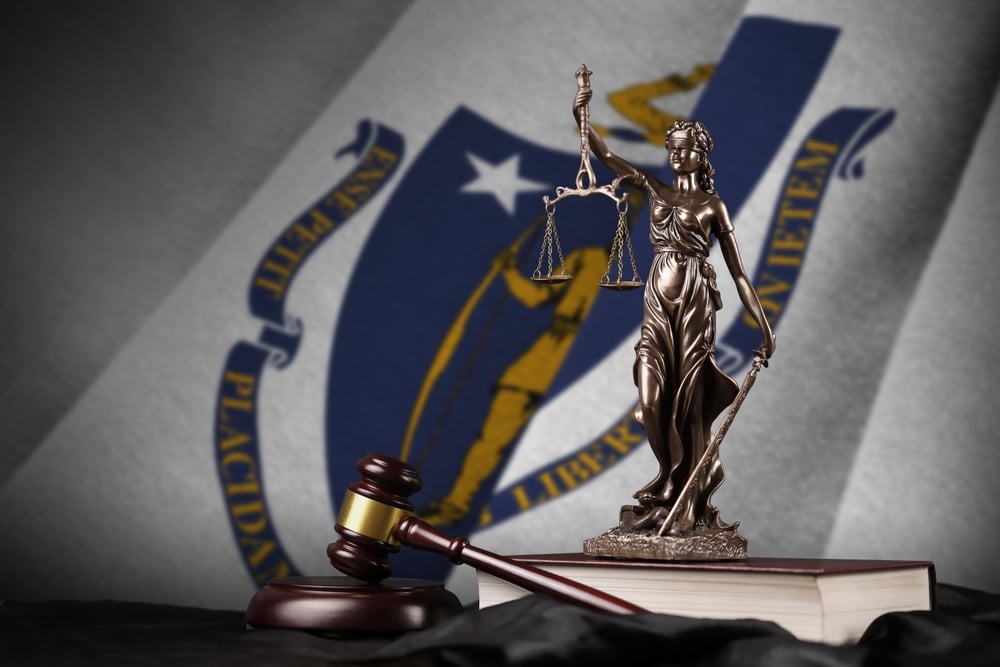
Massachusetts refers to drunk driving offenses as Operating Under the Influence (OUI) and maintains strict enforcement policies. The state enforces a per se blood alcohol concentration (BAC) limit of 0.08% and implements implied consent laws requiring drivers to submit to chemical testing when requested by law enforcement with reasonable suspicion.
The Commonwealth’s enforcement approach reflects its dense population centers, extensive university presence, and diverse geography from coastal areas to rural western regions. Law enforcement agencies coordinate efforts across municipal, county, and state levels, with particular attention to high-risk areas and times.

0.08% or higher for regular drivers and 0.04% for commercial drivers

Yes

30 days

Conditional

No
Massachusetts presents a complex OUI landscape shaped by its dense urban corridors, extensive university population, and diverse geographic regions. The Greater Boston metropolitan area, with its concentration of colleges and entertainment districts, creates unique enforcement challenges and prevention needs.
The state’s seasonal tourist destinations, from Cape Cod to the Berkshires, require adaptive enforcement strategies. The presence of numerous colleges and universities significantly influences both enforcement patterns and prevention strategies, particularly in urban areas.
Massachusetts implements a graduated penalty system for OUI offenses, with increasing severity for subsequent violations. First-time offenders face up to 2.5 years in jail, fines ranging from $500 to $5,000, and license suspension for one year, with alternative disposition programs available for eligible offenders.
Multiple offenders face mandatory minimum jail sentences, substantial fines, and extended license revocations. The state maintains lifetime lookback periods for previous offenses and requires ignition interlock devices for multiple offenders.
Massachusetts imposes enhanced penalties for aggravating factors including high BAC levels (0.20% or higher), causing serious injury or death, and operating with a child passenger under 14. These circumstances often result in felony charges, mandatory jail time, and extended license revocations.
The state maintains particular focus on cases involving serious bodily injury or death, with penalties including up to 10 years in state prison. Commercial drivers face stricter BAC limits (0.04%) and more severe consequences, reflecting the state’s commitment to transportation safety.
Massachusetts employs comprehensive enforcement strategies including marked and unmarked patrols, sobriety checkpoints, and saturation patrols in high-risk areas. The state coordinates multi-agency enforcement efforts, particularly during high-risk periods and in areas with concentrated entertainment venues.
Law enforcement agencies utilize data-driven approaches to target enforcement resources, with special attention to university areas and entertainment districts. The state maintains specialized units for OUI enforcement, particularly in major metropolitan areas.
Massachusetts utilizes approved breath testing instruments for both preliminary screening and evidentiary testing. The state maintains certified breath testing facilities at key locations and employs mobile breath alcohol testing units for remote areas and checkpoints.
Advanced detection technologies include standardized field sobriety testing equipment, body cameras, and in-car video systems. The state operates certified laboratories for blood testing, with established protocols for sample collection and analysis.
Massachusetts offers multiple treatment options through approved providers, ranging from first-offender programs to intensive treatment for multiple offenders. Programs must meet state certification requirements and address both alcohol and drug abuse issues.
The state emphasizes evidence-based treatment approaches while considering accessibility across diverse geographic regions. Programs incorporate both educational and therapeutic components, with specific requirements based on offense history and assessment results.
Massachusetts requires completion of alcohol education or treatment programs for all OUI offenders, with program requirements determined by offense level and assessment results. First offenders may be eligible for the 24D program, a structured education and treatment program offering alternative disposition.
Multiple offenders face more intensive treatment requirements, including residential programs in some cases. The state maintains strict oversight of treatment providers through the Department of Public Health’s Bureau of Substance Addiction Services.


Massachusetts implements comprehensive monitoring through probation departments, courts, and the Registry of Motor Vehicles. The state utilizes various tools including random alcohol testing, supervised probation, and ignition interlock devices to ensure compliance.
Monitoring programs adapt to urban and rural needs, with electronic monitoring and reporting systems helping manage large caseloads. The state maintains particular focus on compliance in cases involving multiple offenses or aggravating circumstances.
Massachusetts operates a dual-track system processing OUI cases through both criminal courts and the Registry of Motor Vehicles. Administrative license suspensions begin immediately upon arrest or test refusal, independent of criminal proceedings.
The state maintains specific procedures for chemical test failures versus refusals, with refusals resulting in longer license suspensions. Administrative actions focus on licensing issues while criminal proceedings address broader legal consequences.
Administrative hearings examine limited issues including proper testing procedures and reasonable grounds for the stop. The Registry of Motor Vehicles conducts hearings regarding license suspensions and reinstatement requirements.
The process includes provisions for hardship licenses and ignition interlock requirements. Appeals follow specific timeframes and procedures through the Registry of Motor Vehicles and courts.
Massachusetts courts process OUI cases through district courts, with some jurisdictions operating specialized OUI sessions. The court system maintains specific protocols for handling cases, including pre-trial conferences, motion hearings, and trials.
First offenders may be eligible for alternative disposition programs, including the 24D program, while repeat offenders face mandatory minimum sentences. The system emphasizes both punishment and rehabilitation, with judges considering various factors within statutory guidelines.
Key agencies include the Massachusetts State Police, Registry of Motor Vehicles, Department of Public Health, and the Executive Office of Public Safety and Security. The Registry of Motor Vehicles manages licensing and administrative matters, while the Department of Public Health oversees treatment programs.
District Attorneys’ offices handle prosecution, working with local law enforcement and probation departments. The State Police Crime Laboratory provides forensic testing services and expert testimony.
Massachusetts’s position in New England creates significant cross-jurisdictional enforcement challenges. The state participates in regional enforcement initiatives and information sharing agreements with neighboring states, particularly important given the high volume of interstate commuter traffic around Boston.
The state maintains specific protocols for handling out-of-state licenses and coordinates with other jurisdictions through the Driver License Compact. Special attention is given to cases involving out-of-state college students and seasonal tourists.
Massachusetts contains multiple jurisdictional layers including state, county, municipal, and federal lands. Cases involving federal facilities, educational institutions, and interstate highways require specific protocols and inter-agency coordination.
The Greater Boston metropolitan area presents unique jurisdictional challenges requiring coordination among multiple agencies. Special considerations apply to cases involving federal employees and cases crossing jurisdictional boundaries.
First-time OUI offenses in Massachusetts typically result in costs exceeding $10,000, including fines, fees, legal expenses, and increased insurance premiums. Multiple offenders face substantially higher costs, often exceeding $30,000 with mandatory treatment and monitoring requirements.
The state dedicates significant resources to enforcement and prevention, particularly in urban areas and around educational institutions. Additional economic impacts include lost wages, property damage, and medical costs associated with OUI incidents.


Massachusetts communities bear substantial burdens from OUI incidents, particularly in densely populated areas and near educational institutions. The state’s high concentration of colleges and universities creates unique challenges regarding young driver education and enforcement.
Social impacts extend beyond direct costs to include family disruption, workplace effects, and strain on emergency services. Urban areas face particular challenges with high incident rates and resource demands.
Recent legislative focus includes strengthening penalties for high BAC offenses and expanding ignition interlock requirements. The state considers updates to testing procedures and penalty structures to address emerging impairment issues, including marijuana and prescription medications.
The Commonwealth continues to evaluate treatment alternatives and monitoring technologies, with emphasis on reducing repeat offenses. There is increasing attention to ride-sharing services and alternative transportation options, particularly in urban and university areas.
Massachusetts implements advanced enforcement technologies including electronic citation systems and real-time data sharing between agencies. Law enforcement agencies utilize data analytics to identify high-risk locations and times for targeted enforcement.
The state explores new monitoring technologies while addressing challenges of urban density and cross-jurisdictional coordination. Implementation considers the need for compatibility across multiple jurisdictions and agencies.
Massachusetts faces increasing challenges with drug-impaired driving, particularly involving marijuana following its legalization and the ongoing opioid crisis. The state’s dense urban areas and large student population create unique patterns of substance use and impaired driving risks.
The growth of ride-sharing services and changing transportation patterns presents new enforcement challenges. Changes in social attitudes and nightlife patterns, particularly in university areas and entertainment districts, require adaptive enforcement strategies.
Massachusetts implements comprehensive prevention strategies targeting various demographics, with special attention to young drivers and college students. Programs include school-based initiatives, university partnerships, and community outreach efforts.
The state provides specialized education for alcohol servers and establishments near educational institutions. Prevention efforts adapt to local needs, with different approaches for urban centers versus suburban and rural communities.
OUI convictions in Massachusetts significantly impact employment opportunities, particularly in industries requiring driving or professional licenses. The state’s large healthcare, education, and technology sectors create particular concerns for professionals facing OUI charges.
License suspensions create significant challenges for commuters in areas with limited public transportation. The presence of numerous colleges, hospitals, and technology companies means many professionals face both immediate and long-term career impacts.
Massachusetts tracks treatment outcomes through standardized reporting systems, showing varying success rates across different program types. Urban and suburban programs face distinct challenges with accessibility and resources, requiring different approaches to delivery.
Programs incorporating comprehensive support services and addressing regional-specific challenges show improved outcomes. The state continuously evaluates program effectiveness, adjusting requirements based on outcome data and demographic needs.
OUI convictions in Massachusetts result in significant insurance consequences, with premium increases often exceeding 300%. The state’s unique insurance rating system includes surcharges for OUI convictions lasting several years.
Multiple offenses may result in policy cancellation or placement in high-risk pools. The state monitors insurance compliance through electronic verification systems and requires maintenance of higher coverage limits for offenders.


Massachusetts does not require SR-22 filings but maintains strict insurance verification requirements for OUI offenders. The state’s unique insurance system includes specific requirements for maintaining coverage after an OUI conviction.
Insurance compliance is monitored through electronic reporting systems and the Registry of Motor Vehicles. Requirements include maintaining coverage above minimum liability limits, creating significant financial burden particularly in urban areas with higher base rates.
OUI convictions in Massachusetts create significant challenges, particularly acute in areas with limited public transportation. License sanctions impact essential activities including work, medical appointments, and family responsibilities, especially challenging in suburban and rural areas.
Financial burdens from fines, fees, and increased insurance costs can create long-term economic hardship. Social stigma and professional impacts may be particularly challenging in the state’s professional and academic environments.
Massachusetts’s OUI enforcement and prevention system reflects its unique character as a state with dense urban areas, numerous educational institutions, and diverse geographic regions. The framework combines strict enforcement with rehabilitation opportunities while addressing the specific challenges of serving populations ranging from urban professionals to college students and rural residents.
The state’s position as a major educational and professional center creates distinct circumstances for both enforcement and prevention efforts. The presence of numerous colleges and universities, along with dense urban areas and seasonal tourist destinations, presents unique challenges for coordination and enforcement.
The legal system maintains clear consequences while providing paths to recovery through structured treatment and monitoring programs. Administrative procedures work alongside criminal proceedings to ensure swift action while maintaining due process rights. The state’s approach recognizes the need for specialized considerations regarding urban density, student populations, and transportation patterns.
The economic and social impacts of OUI convictions are particularly significant given the state’s high cost of living and professional employment base. Treatment and rehabilitation programs must overcome challenges of urban density and accessibility, often requiring innovative solutions including electronic monitoring and regional cooperation.
Recent developments focus on addressing emerging challenges such as marijuana-impaired driving and the integration of new enforcement technologies, while maintaining sensitivity to urban and suburban needs. The state continues to adapt its approach through legislative updates and program evaluations, ensuring effectiveness across its diverse geographic and demographic landscape.
At DUI 101, our mission is to empower you with the knowledge needed to make informed decisions during this challenging time. Explore our articles and guides to better understand your situation and the steps ahead.
© 2024 Chapman SEO LLC. This website is for educational and informational purposes only. All content is created using AI technology and maintained by non-lawyers and should not be considered legal advice. The information provided is general in nature and may not be suitable for your specific situation. Always consult with a qualified legal professional for advice regarding your individual circumstances. We do not create attorney-client relationships through this website. By using this site, you acknowledge that you have read and understand these terms.